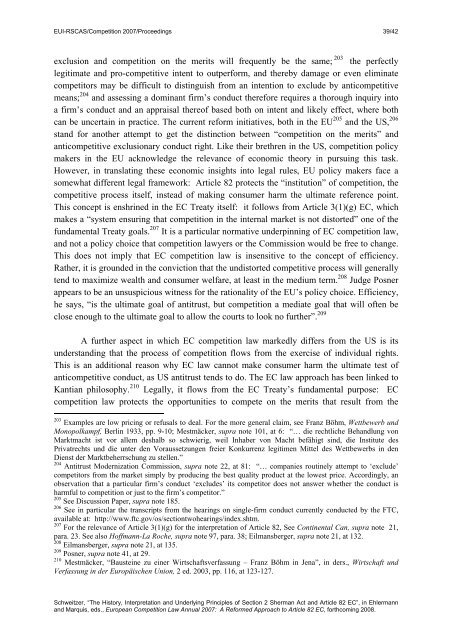The History, Interpretation and Underlying Principles of Section
The History, Interpretation and Underlying Principles of Section
The History, Interpretation and Underlying Principles of Section
Create successful ePaper yourself
Turn your PDF publications into a flip-book with our unique Google optimized e-Paper software.
EUI-RSCAS/Competition 2007/Proceedings 39/42<br />
exclusion <strong>and</strong> competition on the merits will frequently be the same; 203 the perfectly<br />
legitimate <strong>and</strong> pro-competitive intent to outperform, <strong>and</strong> thereby damage or even eliminate<br />
competitors may be difficult to distinguish from an intention to exclude by anticompetitive<br />
means; 204 <strong>and</strong> assessing a dominant firm’s conduct therefore requires a thorough inquiry into<br />
a firm’s conduct <strong>and</strong> an appraisal there<strong>of</strong> based both on intent <strong>and</strong> likely effect, where both<br />
can be uncertain in practice. <strong>The</strong> current reform initiatives, both in the EU 205 <strong>and</strong> the US, 206<br />
st<strong>and</strong> for another attempt to get the distinction between “competition on the merits” <strong>and</strong><br />
anticompetitive exclusionary conduct right. Like their brethren in the US, competition policy<br />
makers in the EU acknowledge the relevance <strong>of</strong> economic theory in pursuing this task.<br />
However, in translating these economic insights into legal rules, EU policy makers face a<br />
somewhat different legal framework: Article 82 protects the “institution” <strong>of</strong> competition, the<br />
competitive process itself, instead <strong>of</strong> making consumer harm the ultimate reference point.<br />
This concept is enshrined in the EC Treaty itself: it follows from Article 3(1)(g) EC, which<br />
makes a “system ensuring that competition in the internal market is not distorted” one <strong>of</strong> the<br />
fundamental Treaty goals. 207 It is a particular normative underpinning <strong>of</strong> EC competition law,<br />
<strong>and</strong> not a policy choice that competition lawyers or the Commission would be free to change.<br />
This does not imply that EC competition law is insensitive to the concept <strong>of</strong> efficiency.<br />
Rather, it is grounded in the conviction that the undistorted competitive process will generally<br />
tend to maximize wealth <strong>and</strong> consumer welfare, at least in the medium term. 208 Judge Posner<br />
appears to be an unsuspicious witness for the rationality <strong>of</strong> the EU’s policy choice. Efficiency,<br />
he says, “is the ultimate goal <strong>of</strong> antitrust, but competition a mediate goal that will <strong>of</strong>ten be<br />
close enough to the ultimate goal to allow the courts to look no further”. 209<br />
A further aspect in which EC competition law markedly differs from the US is its<br />
underst<strong>and</strong>ing that the process <strong>of</strong> competition flows from the exercise <strong>of</strong> individual rights.<br />
This is an additional reason why EC law cannot make consumer harm the ultimate test <strong>of</strong><br />
anticompetitive conduct, as US antitrust tends to do. <strong>The</strong> EC law approach has been linked to<br />
Kantian philosophy. 210 Legally, it flows from the EC Treaty’s fundamental purpose: EC<br />
competition law protects the opportunities to compete on the merits that result from the<br />
203<br />
Examples are low pricing or refusals to deal. For the more general claim, see Franz Böhm, Wettbewerb und<br />
Monopolkampf, Berlin 1933, pp. 9-10; Mestmäcker, supra note 101, at 6: “… die rechtliche Beh<strong>and</strong>lung von<br />
Marktmacht ist vor allem deshalb so schwierig, weil Inhaber von Macht befähigt sind, die Institute des<br />
Privatrechts und die unter den Voraussetzungen freier Konkurrenz legitimen Mittel des Wettbewerbs in den<br />
Dienst der Marktbeherrschung zu stellen.”<br />
204<br />
Antitrust Modernization Commission, supra note 22, at 81: “… companies routinely attempt to ‘exclude’<br />
competitors from the market simply by producing the best quality product at the lowest price. Accordingly, an<br />
observation that a particular firm’s conduct ‘excludes’ its competitor does not answer whether the conduct is<br />
harmful to competition or just to the firm’s competitor.”<br />
205<br />
See Discussion Paper, supra note 185.<br />
206<br />
See in particular the transcripts from the hearings on single-firm conduct currently conducted by the FTC,<br />
available at: http://www.ftc.gov/os/sectiontwohearings/index.shtm.<br />
207<br />
For the relevance <strong>of</strong> Article 3(1)(g) for the interpretation <strong>of</strong> Article 82, See Continental Can, supra note 21,<br />
para. 23. See also H<strong>of</strong>fmann-La Roche, supra note 97, para. 38; Eilmansberger, supra note 21, at 132.<br />
208<br />
Eilmansberger, supra note 21, at 135.<br />
209<br />
Posner, supra note 41, at 29.<br />
210<br />
Mestmäcker, “Bausteine zu einer Wirtschaftsverfassung – Franz Böhm in Jena”, in ders., Wirtschaft und<br />
Verfassung in der Europäischen Union, 2 ed. 2003, pp. 116, at 123-127.<br />
Schweitzer, “<strong>The</strong> <strong>History</strong>, <strong>Interpretation</strong> <strong>and</strong> <strong>Underlying</strong> <strong>Principles</strong> <strong>of</strong> <strong>Section</strong> 2 Sherman Act <strong>and</strong> Article 82 EC”, in Ehlermann<br />
<strong>and</strong> Marquis, eds., European Competition Law Annual 2007: A Reformed Approach to Article 82 EC, forthcoming 2008.

















